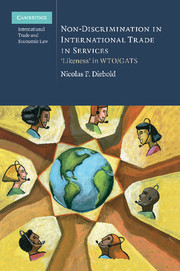Book contents
- Frontmatter
- Contents
- Foreword
- Acknowledgements
- Abbreviations
- List of Cases
- List of Legal Texts
- List of Documents
- Introduction
- PART I Foundations
- PART II Framing the conceptual breadth of ‘likeness’ in GATS
- PART III GATS specific ‘likeness’ issues
- PART IV Methodology for the ‘likeness’ analysis in GATS
- Bibliography
- Index
Introduction
Published online by Cambridge University Press: 10 January 2011
- Frontmatter
- Contents
- Foreword
- Acknowledgements
- Abbreviations
- List of Cases
- List of Legal Texts
- List of Documents
- Introduction
- PART I Foundations
- PART II Framing the conceptual breadth of ‘likeness’ in GATS
- PART III GATS specific ‘likeness’ issues
- PART IV Methodology for the ‘likeness’ analysis in GATS
- Bibliography
- Index
Summary
Given the complexity of the subject-matter of trade in services, as well as the newness of the obligations under the GATS, we believe that claims made under the GATS deserve close attention and serious analysis. We leave [the] interpretation of Article II of the GATS to another case and another day.
WTO Appellate BodyThe General Agreement on Trade in Services (GATS) was concluded under the institutional framework of the World Trade Organization (WTO) resulting from the Uruguay Round in 1994. Even though the potential contribution of international trade in services to economic growth and development had long been recognized, GATS was the first and only multilateral agreement aimed at the liberalization of international trade in services. In comparison to the General Agreement on Tariffs and Trade (GATT) from 1947 and other international agreements regulating trade in goods, it is still a relatively new agreement governing an economic sector which has not typically been subject to international trade regulations. The conclusion of GATS had thus been greeted as a new milestone in trade liberalization. Considering the potential of international trade in service and the fact that it is inhibited by many different types of trade obstacles, it is somewhat surprising that to date only five cases involving claims of GATS violations have arisen under WTO dispute settlement procedures. This lack of substantial jurisprudence considerably contributes to the prevailing uncertainty among Members and trade practitioners with regard to the exact meaning of many obligations embodied in GATS.
- Type
- Chapter
- Information
- Non-Discrimination in International Trade in Services‘Likeness' in WTO/GATS, pp. 1 - 12Publisher: Cambridge University PressPrint publication year: 2010
- 2
- Cited by

